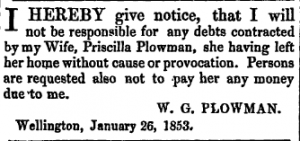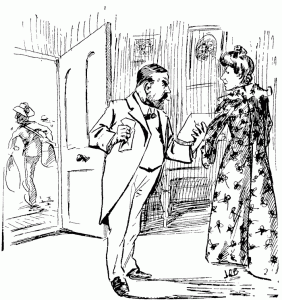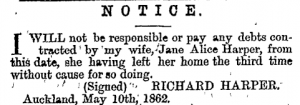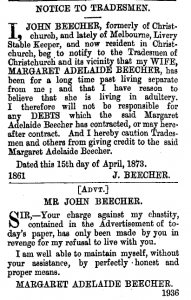I'm fascinated by the debt notices that appeared with great frequency in newspapers from the 1840s right through to the 1940s and beyond.
The example to the right is a particularly juicy one, with cuckolded Fred going so far as to name Emma's purported lover. Scandalous! Quite what happened to Frederick and the adulterous Emma is unknown, equally mysterious is the fate of love rat John James Imrie. Poor Alexander Perry however drowned when his schooner The Phoenix, opens a new window sunk with all hands in 1846.
W. G. Plowman's notice of 1853 is very standard in form.Clearly there was some marital discord however the couple didn't divorce and were still together when William died after an accident (or was it?!) in 1871, opens a new window. Poor Priscilla wasn't left a merry widow, in 1891 her son John George Plowman, opens a new window appeared in court and was forced to pay towards the maintenance of his destitute mother. Priscilla died in 1902, opens a new window and was buried with her husband. In her will, Priscilla left her modest assets to her daughters: some cash, her sewing machine, clothes and the contents of her bedroom, all for the exclusive use and benefit of her girls.
So what was up with this notice nonsense? Readers you may be shocked and surprised to learn that married women had no fiscal status at this period. On marriage, everything a woman owned, either through inheritance or by her own industry, became the property of her husband.
The only minor advantage to this cruddy situation was that women couldn't be imprisoned for debt, or even sued for debt if their husband wasn't present in court. Under the law of necessities, a husband was bound to maintain his wife, but on separation many men attempted to avoid their obligation and refused to maintain their wives (and children), debt notices were the most obvious example of this. In reality, the law of necessities was inconsistently applied and widely open to interpretation. A tradesman presenting his bill to an estranged husband and being refused payment could take the legal route, and in some cases a judge might uphold the husband's responsibility under the law of necessities and, in others, dismiss it.
Despite the legal uncertainty these notices persisted. I'd be so bold as to suggest that that while the legal benefit of printing these notices was dubious, the satisfaction in naming and publicly shaming their wives must have been priceless.
In 1866 Edward Lyons sued Dr Alexander Hunter, opens a new window for the cost of providing board and lodgings for Hunter's estranged wife. The Magistrate considered that Mrs Hunter (Janet Rocheid nee Handyside) was justified in leaving her home and contracting "debts for any necessaries she might require", opens a new window. Dr Hunter's conduct was distinctly shady and included "improper intimacy" with a Mrs Lockhart, domestic violence, abduction and confinement.
In another tragic tale Auckland butcher Richard Harper paid for a number of notices in 1862 regarding his estranged wife Jane Alice. Jane Alice left Richard again in 1863 and moved into lodgings with her two young sons. On 16 June 1863, opens a new window Richard stabbed her to death. Shortly before his execution at Mount Eden, it was revealed that Richard was a bigamist with a wife and child, opens a new window back in London.
On a more positive note, some notices did not go unanswered. John Beecher placed a variety of notices in the Christchurch papers in 1873 warning tradesmen about his estranged and "adulterous" wife Margaret Adelaide Beecher. She was having none of it and fired back with her own delicious little notice addressing his aspersions about her chastity and finances.
More information
- More local history resources, opens a new window
- Local and Family history events at Christchurch City Libraries
- New Zealand Her-story, New Zealand women in history, opens a new window
- Historical newspaper eResources, opens a new window at Christchurch City Libraries







Add a comment to: Damsels in debt – Good old fashioned public shaming